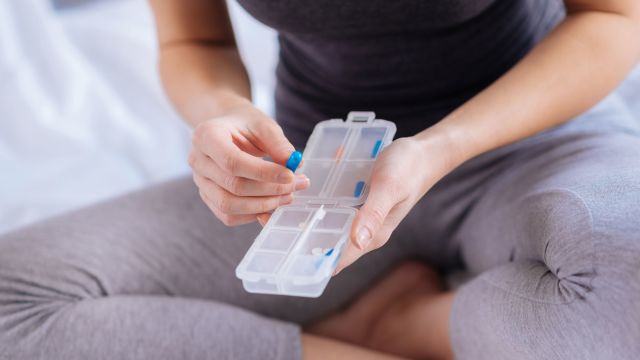Updated on March 25, 2024.
If you have diabetes, you may need to take medication to help you keep your blood sugar levels in your target range. And since diabetes increases your risk for other conditions—like high blood pressure, high cholesterol and kidney-related problems—you may need to take medications for those issues, too. Here are 12 strategies to help you make sure you never miss a dose.
Know what you’re taking
1. Quiz your healthcare provider about the medications you’re taking. Specifically ask:
- Why am I taking this?
- How does this drug work?
- How can I fit taking these medications into my schedule?
- What are the potential side effects to look out for?
Having a full understanding of the health benefits of your medications may help you stick to your treatment plan.
2. Pick one provider on your care team to oversee all of your medications. It can help you avoid miscommunication that may lead to prescription mistakes, such as having prescriptions for two drugs that do the same thing. If possible, fill all of your prescriptions at the same pharmacy to avoid potential redundancies.
Create reminders
3. Take your pills or morning insulin injection at the same time. Linking your medicines with an already-established daily routine such as brushing your teeth in the morning can help you take your medications on schedule.
4. Schedule reminders on your cell phone to alert you when to take your medications, or place notes on your refrigerator or other location that you're likely to see on a regular basis.
Stay organized
5. Establish a regular day and time for placing a week’s worth of pills into a pill organizer. For larger amounts, try a stack of plastic containers.
6. Label pill bottles with stickers of different colors to distinguish between nighttime and daytime doses.
Plan for sticking with your medications
7. Avoid missing a dose by getting medication refills at least four days before running out. Enrolling in a free medication refill program can help ensure you never run low on your medications. You can receive a call or text when your prescriptions are ready for pickup.
8. Ask your pharmacist to arrange your prescriptions so that you can pick up refills for several drugs together, once or twice a month. It can save time and trips to the pharmacy, and ensure you have your medicine when you need it.
9. If you have problems with your hands such as arthritis or numbness in your fingers, ask for a non-childproof cap, which can simplify bottle opening. Another option: Switch to easier-to-open blister packs, which have individually sealed pills that you push out through a foil backing.
10. If you experience side effects, talk to your pharmacist, doctor, nurse practitioner or diabetes educator right away about what to do.
11. If you often forget to take your medications, ask your health care provider if it’s possible to simplify your dosing regimen. You can also enlist a family member to remind you when it’s time to take a dose.
Missed doses of medication can lead to high blood sugar levels. With some planning, building tips like these into your routine may help you manage your diabetes better.






